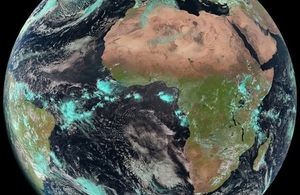Vivid Economics (Africa) Deforestation prevention
Deforestation prevention with land-use monitoring and valuation in Côte D’Ivoire

Africa from space, seen by Meteosat. Credit: Eumetsat.
Project Title
Deforestation prevention with land-use monitoring and valuation in Côte D’Ivoire
Delivery team
Vivid Economics, RSAC (UK); REDD+ Permanent Executive Secretariat, Impactum, UN Food and Agriculture Organisation, UN Environment Programme, Bureau National d’Etudes Techniques et de Development, Centre Universitaire de Recherche et d’Application en Teledetection
Project overview
The project aims to alleviate two key development problems in Cote D’Ivoire: rural poverty, which afflicts more than half of the rural population, and deforestation for economic development, which has led to the loss of 80% of the country’s natural forests. The two problems are linked as current rates of deforestation not only represent a major environmental problem, but also contribute to a lack of rural development.
The overall objective of this project is to contribute to efforts to reduce poverty and protect forests by developing tools that help policy-makers preserve and expand forests to the greatest benefits of rural communities, and to integrate relatively unproductive smallholders into more valuable global supply chains. This project will do this by developing tools that drive two key outcomes:
- improved monitoring and enforcement efforts that prevent forest loss and prioritise afforestation; and
- better targeted support to local economic development and sustainable supply chains through payment for ecosystem services (PES) schemes.
These two outcomes will be achieved by creating three foundational tools:
- Land use inventory that classifies and differentiates physical surface cover types. This will be developed using newly available data from the Copernicus Sentinel satellite that offers higher resolution and revisit frequency than Landsat, which has been used for mapping in the past, supplemented by even higher resolution information from RapidEYE and SPOT.
- Natural capital valuation framework that informs national reforestation and forest protection strategies, and supports the extension of sustainable supply chains. This will integrate the land-use inventory with other economic information on the value of production and eco-systems services to map the value of land under different uses, recorded in a natural capital accounting balance sheet.
- Forest disturbance early warning system to tighten enforcement of land-use rules. This will make use of a technique developed by RSAC for the rapid detection of forest disturbances using radar time series.
All three tools represent substantial improvements upon what is currently available, but the real benefit of the project lies in their combination and close integration into policy and regulatory activity. The tools will cover an area in the south west of Cote D’Ivoire covered by the Emissions Reduction Programme (ERP) initiative. The ERP region was chosen as it contains much of the country’s remaining natural forests and is the focus of the development of sustainable supply chains and PES schemes in the country.